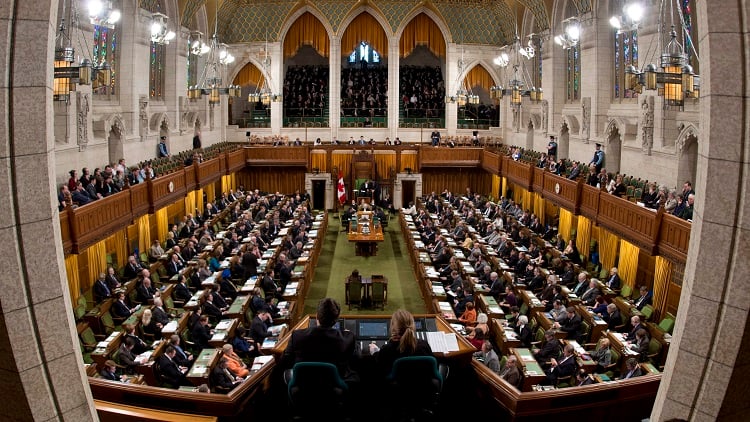Mulcair proposes new measures to address harassment on the Hill
‘We must … get our own House in order’
New Democratic Party leader Thomas Mulcair receives a standing ovation from his caucus while standing to reply to the government’s plan to participate in a military campaign against Islamic State militants, in the House of Commons on Parliament Hill in Ottawa October 3, 2014. Canadian fighter jets will take part in U.S.-led air strikes against Islamic State militants operating in Iraq for up to six months, Prime Minister Stephen Harper said on Friday. Chris Wattie/Reuters
Share

NDP Leader Thomas Mulcair has written to Prime Minister Stephen Harper and Liberal Leader Justin Trudeau to propose a mutli-party effort to ensure a “respectful work environment” on Parliament Hill.
To those ends, we believe a new approach must include the following considerations:
• a clear definition of harassment – to be communicated to all members and employees – making it clear that there shall be no harassment, sexual or otherwise, tolerated in Parliament.
• a new, formal Code of Conduct around harassment, which could amend the Standing Orders or other rules that govern Parliament.
• the nomination of an independent non-partisan third party officer of Parliament responsible for: reviewing incidents in a timely manner, advising complainants on the processes and services available to them – including those provided by the Criminal Code and by human rights legislation – undertaking investigations where appropriate, and proposing remedies.
• a confidential and fair process to be followed when a complaint arises, which provides protection and support to those making a complaint.
• the unencumbered right of victims to maintain control over their complaint and the process, including the right to have their privacy respected.
• a system of training and education for members and employees, including ensuring all staff and members are aware of complaints procedures.
• the bringing into force of appropriate parts of the Parliamentary Staff Relations Act, Part II, particularly Article 86, to provide for greater protections for employees.
You can view the full letter here.
In response, the Liberal leader’s office says, “As we have previously indicated, we’ll look at any constructive measure to improve workplace safety and protect people from harassment.” The Prime Minister’s Office, meanwhile, tells me that, “Any allegation of sexual harassment must be taken very seriously. The Board of Internal Economy has been charged with looking into this matter and that process will now unfold.”
It has, of course, been two weeks now since Justin Trudeau publicly suspended two MPs—Massimo Pacetti and Scott Andrews—from the Liberal caucus over unspecified allegations of personal misconduct involving two other MPs.